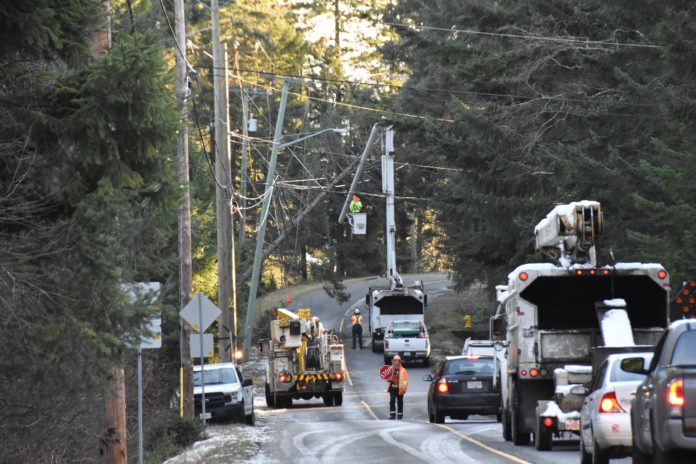So the power went out on you, and you don’t know what to do?
Don’t panic! People lived for hundreds of thousands of years before electricity and you will survive several hours or overnight.
Vancouver Island power outages can be slightly more frequent because of our power lines being constantly exposed to the elements. Other cities and provinces have the convenience of hiding some of their power lines underground, but due to Vancouver Island’s bedrock, that is a difficult and expensive feat for us.
When an adverse weather system rolls over the island — be it wind, snow, rain or some combo of the three of those — it’s best to be prepared for an outage. This is especially important for Vancouver Islanders who live in rural and remote areas.
If you’re ‘in the dark’ on what you should and shouldn’t do in the event of a power outage on Vancouver Island, here are some tips:
Have an emergency kit
It’s a small thing to put together some essentials packed aside so you have them all in one place and don’t have to bump around a dark home in order to find the flashlight you may have leant to a neighbour and forgot about.
Water, batteries, a flashlight (for scary ghost stories), a first aid kit and a wireless radio are the bare minimum that should be included, but BC Hydro advises additional utilities such as a a power bank to charge your phone, a can opener and some canned food.
If you are someone who can’t live without power for long, have a gas powered generator you can run somewhere outside with an extension cord to bring power safely indoors.
Heaters and propane stoves are also good for if you think it will be a while before power comes back on.
Be smart with your food
Your fridge will keep food cold for up to four hours if unopened and your freezer can keep food cold for up to 48 hours so be sure to keep those doors closed unless you absolutely need it. If you anticipate your power outage will last more than four hours, put perishable refrigerated items into a cooler with ice.
To cook food, if you don’t have a gas powered range, have a camping stove with small propane canisters and a lighter somewhere accessible. Just be sure to cook your food outside as the propane fumes can accumulate indoors and are not healthy to breathe in large amounts.
If you come across a downed power line
Treat all power lines as if they are live wires.
A downed power line is extremely dangerous. Be sure to keep a safe distance away (no less than 10 metres for good measure) and call 911 immediately so emergency crews can contain the area until BC Hydro can deal with the priority issue.
If you are in your vehicle and a power line comes into contact with your car or if you crash your vehicle into a hydro pole, do not exit the vehicle and call 911 immediately.
If for some reason you need to get out of your vehicle, it’s crucially important that your body never touches the ground while still in contact with the vehicle. This will make your body act like a circuit and the electricity will travel through your body to try and get to the ground — this could severely injure you or be fatal.
While evacuating the vehicle you must jump with your feet tightly together so you don’t make this mistake.
Wait it out
Listen to the radio for updates from local stations, but try to remain inside. If power is out for you, local infrastructure such as traffic lights and streetlights may be out too which can make for dangerous conditions.
Try to come up with activities to keep children and family members busy if you are with them. Take turns making up ghost stories or try to play a board game if you have enough flashlights.
BC Hydro updates their outage map frequently so you can keep an eye on what is going on around your area. If your outage isn’t shown on the outage map, call 1-800-224-9376.


